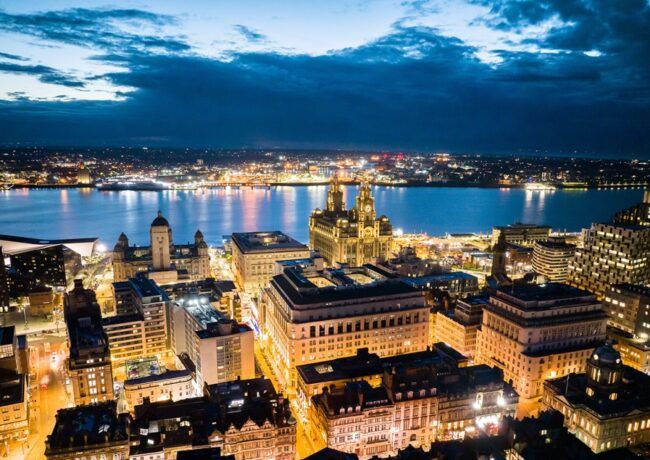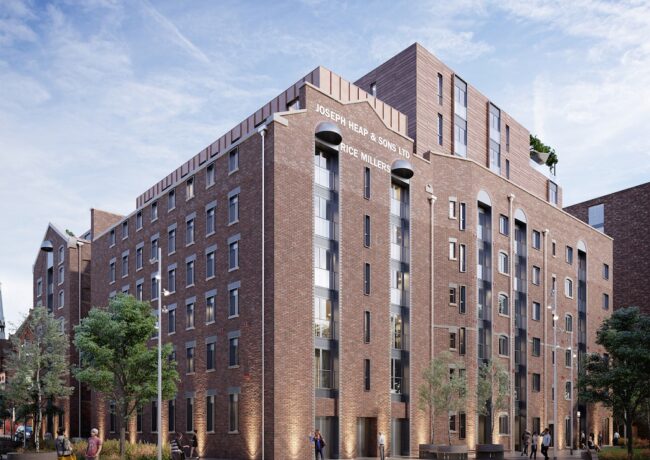Commentary
COMMENT | Cracking the Liverpool economic enigma
 The puzzle that is the Liverpool economy was no better illustrated than during the recession that emerged in 2007, writes Alastair Carmichael of GVA.
The puzzle that is the Liverpool economy was no better illustrated than during the recession that emerged in 2007, writes Alastair Carmichael of GVA.
Unemployment in the city region fell for 18 of the 19 months that the country was in recession, the legacy of major infrastructure completions such as Liverpool ONE, the arena and convention centre and its refurbished and expanded airport.
For possibly the first time in its history the city’s economy was counter-cyclical, yet it was caught up in the national bolt away from property. Wider weaknesses in its capital and investment markets meant the city was hit harder than most, as bank funding and institutional activity dried up.
A response was forthcoming in 2012 with the formation of the £39m Chrysalis Fund, designed to kick-start regeneration in the Liverpool city region. Continued contraction of the debt markets, however, saw the Fund become one of the few sources of investment available for any real estate development.
Other aspects of the economy continued to function well with output growing 8.3% in the five years to the end of 2014. But it was the return of confidence in the autumn of 2013 that put the spring back in Liverpool’s property market. Away from the rhetoric of the Northern Powerhouse, the on-the-ground transformation of Liverpool speaks for itself. One well-known Liverpool property agent commented last week that he’d “never seen such a sustained period of commercial property transactions” in his 30-year career.
Interestingly, the city has now started to understand where its competitive advantage lies: not in trying to emulate Manchester or Birmingham but by being different and interesting, which is what Liverpool does best. The new story of Liverpool talks about things other cities cannot offer – ‘superports’, cruise liners and its unique culture and leisure offer. The surge in hotel development and investment to match the growth in visitor numbers is but one of a number of indicators of the market’s enthusiastic response to this new narrative; occupancy is up from 71.2% in 2013 to 77.8% last year, despite a growth in city centre room stock from 3,481 in 2008 to 7,847 in 2016.
In addition, there is now a focus on high value industries and life sciences around the Knowledge Quarter as stakeholders have coalesced around its potential to create the well-paid jobs in the sort of numbers that are capable of transforming an economy. Chrysalis was the catalyst for some of the early projects – notably the Accelerator project – and that success, as well as better-functioning debt markets, has seen the Fund evolve once more and turn its hand to different opportunities.
Regeneration is never simply about monetary investment. For Liverpool’s regeneration to continue, it is important for investment to be strategic, innovative and commercially well-founded.
In partnership with local authorities who provide pipeline projects and political willpower, The Chrysalis Fund is focusing on those emerging industries and development areas which will become the future success stories for the city region. As the city region’s economy continues to strengthen, such partnerships look set to come in to their own.
- Alastair Carmichael is head of real estate finance at GVA and advises Chrysalis as part of the firm’s remit to the Fund





The most irritating thing is the lack of commercial investment in the City and the slowness of Peel to organise anything substantial yet on the Land banks they have. With apartments being constructed all over the city centre, they have laboured to attract anything until recently to what should be a prime site the waterfront with Princes Dock in particuliar. One can only hope with the continued rejuvenation of the city centre that more commercial developments will be keen to be part of it, creating meaningful jobs and investment.
By Man on bicycle
“the city has now started to understand where its competitive advantage lies: not in trying to emulate Manchester or Birmingham but by being different and interesting, which is what Liverpool does best.”
Spun as a positive, I think this is actually a worrying narrative born of low expectations and defeatism. Basically the advice boils down to ‘leave big business to the big cities, Liverpool is for jollies and a few niche sectors’.
No thanks. Liverpool is a big city of some 1.5m people. And like all big cities it needs a balanced economy, with a wide range of sectors present and doing well. It needs high paid jobs in large numbers. It needs jobs requiring highly valued skills to incentivise upskilling in the workforce. It needs more of what Birmingham and Bristol and Leeds and Manchester have. And it can have it. With ambitious, competent leadership that fights for a share of everything that is going. And does it better than anyone else.
By Deebee
I should add, that this line from Alistair Carmichael does seem to echo the approach taken by the leaders within the Combined Authority. But given that it affords a pretty unappealing future for the city, perhaps we really need to subject this strategy to closer scrutiny and those who espouse it to more questioning. Has anyone asked the population if they agree with this approach? Has anyone assessed and quantified both the positives and the negatives? Exactly what does this future look like?
By Deebee
I have to agree with the comments below for the large part. Whilst it is great news that the economy is proving relatively robust in the Liverpool City Region the ongoing ‘noise’ being made to suggest the city isn’t a major UK conurbation and therefore shouldn’t attempt to secure the more ‘traditional’ industries such as commerce is becoming ever louder and ever more damaging. This clear agenda suits a Manchester centric north of England push as against this backdrop of second class treatment for Liverpool (a city region of over 1.5 million people) it is ever easier to pull focus and investment away from Liverpool and down the M62. I fear no matter what industries Liverpool manages to galvanise it will at the point of real momentum soon then be ushered away under some new Northern Powerhouse style initiative, packaged all the way down the motorway to Manchester or Leeds as “in our and the north’s best interests” – the recent announcements of a massive push to create a hub of bio-sciences in Manchester in direct competition with Liverpool’s new Knowledge Quarter development is telling.
Liverpool’s leaders need to shake off this narrative, denounce the several decades of damaging noise that has done nothing but play down the Liverpool city region’s status and therefore it’s place in the pecking order for investment (HS2 anyone?) and start fighting harder for the 1.5 million people across wider City Region otherwise the talent diaspora will continue and the most Liverpudlians can look forward to is low paid precarious retail and leisure work or a turn on a cruise ship.
To spin it any other way is defeatist.
By Michael McDonough
This notion that Liverpool should focus on niche activities has been around since NWDA syphoned off almost everything of value into Manchester. It sounds attractive at one level until it becomes clear that it’s a one way street with Manchester able to encroach on Liverpool’s niche activities (video gaming, wealth management, etc) whereas Liverpool is discouraged from attempting to reclaim its previous dominance in the financial sector!
A key question is: whose interests does this approach serve most?
It certainly isn’t Liverpool’s.
By J. Southwood
Good points people. Why is only Liverpool entreated to leave entire business sectors to other cities, often those it excelled at historically as one the the world’s leading commercial cities? Manchester or Birmingham should have offices, finance, professional services and so on, precisely the sectors that the UK’s economy – and most well paying jobs – has been based on in recent decades. Liverpool can have whatever’s left so tourism, warehouses and the port and maybe some biotech. However, Manchester, Leeds, Birmingham, etc., aren’t told to keep away from these sectors, Manchester is focussing also on biotech and logistics with Port Salford coming and a massive logistics scheme underway at its airport. And all these cities are also building up their tourist offer and increasing their number of hotel rooms.
A few years ago, because Liverpool had won (to the governments surprise!) Capital of Culture the rhetotic coming from Whitehall and its regional bodies like NWDA and GONW in Manchester was that ‘well you can have culture but leave all the commercial development to Manchester’. Anyone suckered by that deal would have been surprised that Manchester launched its new arts festival after Liverpool’s ECoC win to launch the year before Capital of Culture and steal a march on it, the state and the BBC happily pump-primed and promoted it and Andy Burnham (then a minister) proposed that the national taxpayer pony up for tens of millions to built an opera house in Manchester despite the lack of evidence for it being needed. A couple of years ago, to bribe them into accepting a metro mayor, Manchester got tens of millions from George Osborne for a huge arts centre which appears to be built for no discernable purpose and which they’ll try to find a use for between now and when its built. Liverpool asked in its city regional mayoral negotations for a waterfront concert hall (itself a dubious idea but still) and got the hand. It seems that culture is already another of those sectors in which Liverpool needn’t try to compete.
I doubt that Mr Carmichael, despite being a clever chap, has much in depth knowledge of Liverpool’s economy even though GVA has been given a job in advising the Chysalis fund. His opinion about Liverpool being excluded from sectors seem as being other cities’ strengths whereas Liverpool’s are always fair game to competitors in other cities much reflect via Chysalis the thinking that exists in officiadom in the northwest and probably down in Whitehall. It is chilling stuff. A large metropolitan area cannot survive on tourism, the port although imporant and growing provides little employment. As Deebee says, it needs a diverse economy. Slowly asset stripped of sector after sector while rival cities are pump-primed by the government to give them advantages in them, the whole metropolitan area ultimately faces doom. One by one, options for the city to thrive have been closed off. Finance and insurance, then culture, now it seems biotech, all end up on a growing list of sectors set aside for other places. Liverpool’s metropolitan area is a lot bigger than some in this country think, and it is growing. It is its being prevented from having a divese and successful economy continues there are consequences that will ultimately be felt elsewhere in the country.
By TFG
Good point by J. Southwood. Liverpool’s ‘niche’ activities are those that is has developed itself, usually because Whitehall had not yet woken up to them or those that simply cannot be removed to other cities. In the case of video gaming, that arose in Liverpool because it was a brand new industry and local entrepreneurs set up local companies and in a greater concentration than anywhere else in the country. With the state plantation of Media City into Salford, the NWDA got involved however and lobbied and gave incentives to games companies to relocate to its project there. When it was pointed out that the northwest’s cluster of gaming firms was in Liverpool and so why was he trying to create an artificial one in some derelict Salford docks, the NWDA’s Enda Carey brazenly stated that Liverpool could not ‘have a closed shop’ on gaming. Note this is the precise opposite to the message coming from Whitehall and its various regional quangos say when they argue that Liverpool shouldn’t dare compete in a sector they have set aside to be Manchester’s in its entirety. Anecdotally because of this clear signal from officialdom and the fact that government has made sure that Manchester has much better broadband speeds than Liverpool, Liverpool’s homegrown digital sector has been moving away and often to Manchester. Another job done and another ‘niche’ threatened. Barred from the big stuff and its niches asset stripped from it, the question is what is left? They literally can’t steal the sea and so you have cruise ships but how many decent jobs are a number of cruise ship visits per year going to generate?
By TFG
I agree with all of the above comments. Liverpool needs to cut through the smoke and mirrors of Manchester and compete against it where needed and collaborate only when appropriate. Problem is Burnham has a higher national profile than Rotherham and it shows. Yes, we have an advantage of a world class waterfront but we must be more than retail and tourism. What about our strengths in creative and digital? Life sciences? The great work being done in LJMU and Liverpool University on the low carbon agenda? Now is not the time to take backward steps economically.
By John Smith
TFG good points. Time for our Mayors (yes all three of them) to come out fighting for Liverpool. The PR machine recently pledged by Rotherham needs to get into into overdrive to sell the city, and also counteract the hyperbole coming from Mcr that has being so unquestionably lapped-up by Whitehall, The Guardian, BBC, Transport for North, etc etc
By LEighteen
Liverpool always has had more strings-to-its-bow than its nearest rival, Manchester. The problem is they’ve not always been the right tension…
By Moncleur
The number of comments on a similar theme is telling.
Liverpool needs change. And why leave it to others, or hope that politicians will finally, miraculously see the light?
Organise yourselves. You can do no worse, and you can definitely do better. I dare say some of you have the money and connections necessary. It’s what democracy was made for, so use it.
By John
Ocean Software were a huge and iconic Manchester-based gaming company with a legacy that exists today. There seems to be a perception that Liverpool had a monopoly in this industry; part of the story we tell ourselves I suppose?
The problem with Liverpool is that since it got significantly more government regeneration funding from the NWDA than anywhere else, since it got significantly more funding and preferential treatment through every single state programme since the birth of regional policy some 80 years ago, since it was an Objective 1 recipient of regional structural funds, there seems to be an inbuilt sense of entitlement that government should bias their policies towards Liverpool for ever more. Perhaps even dependence on the state?
This perception is entrenched by the fact that much of Liverpool’s prosperity was founded on the state’s colonial exploits rather than science and innovation, in contrast to other core cities.
The powers that be certainly need to raise their game and there is encouraging signs that the city is starting to be a bit more analytical in understand its strengths and weaknesses rather than resorting to rhetoric and confrontation as is the habit. The developments around the Brownlow Hill, Paddington and the fantastic tourist offfer at Pier Head offer great foundations for growth. We need to build on these and tackle St Johns and Clayton Square, opening out land, overlooking the civic quarter, in the best possible location for high value commercial office space.
By Localist